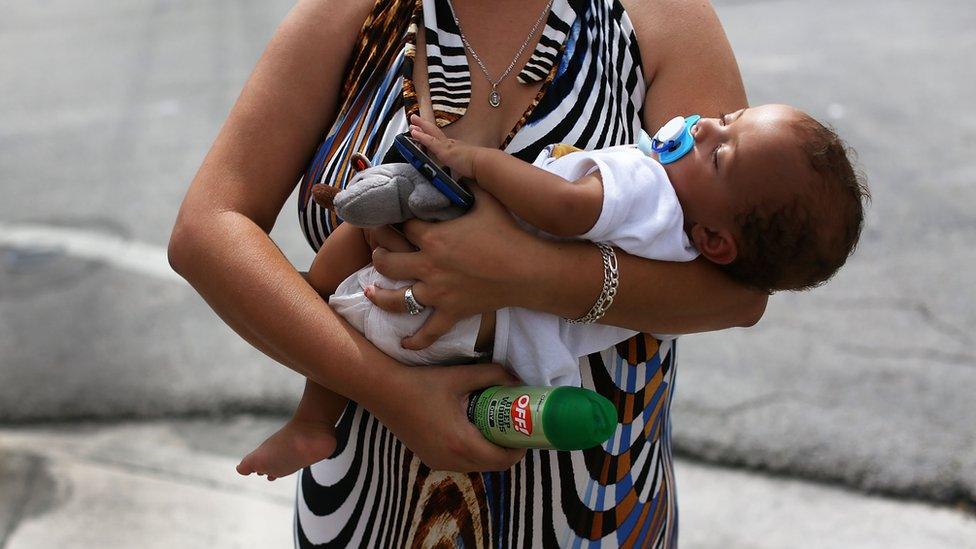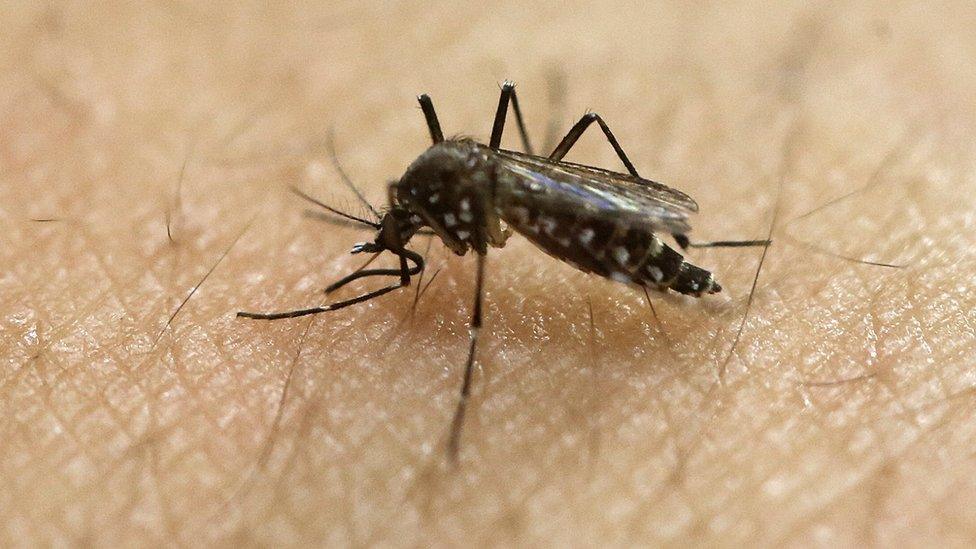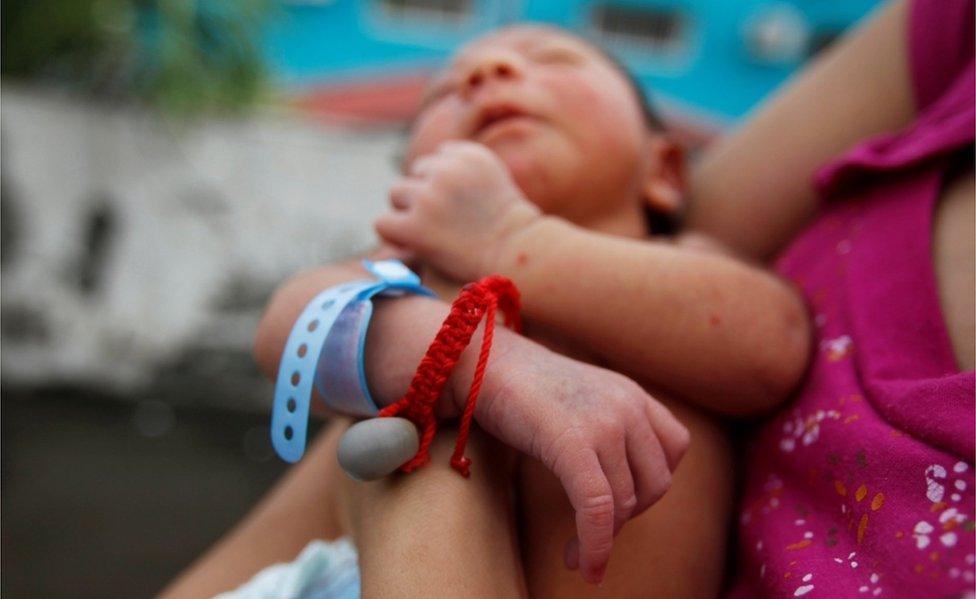Is the US doing enough to fight Zika?
- Published

The threat of Zika in the US has been known about for months. Has enough been done to fight it?
Susie Gilden and her husband did not think they could have any more children when she "magically got pregnant" with their second baby four months ago.
The couple from Florida were delighted with the news, she says. But the outbreak of the Zika virus in the state has unsettled them in what should be a period of excitement.
"For me this pregnancy is filled with anxiety and stress, even though I'm not typically like that," says Gilden.

Susie Gilden is doing everything she can to avoid being bitten by mosquitoes
"It was one thing worrying about whether I was going to have a healthy baby, and whether I could carry the baby to term.
"Now I have to be concerned about whether I'm covered up enough in long sleeves and long pants - not an easy thing in 90F (32C) heat - and covered in Deet [insecticide]. It's added another level of anxiety to the whole experience."
The World Health Organization has said there is a "strong scientific consensus" that Zika causes a birth defect called microcephaly, in which infants develop with abnormally small heads, and the US Centers for Disease Control says the causal link "is now clear".
A baby born in Texas with microcephaly died earlier this month after his mother contracted Zika in Latin America. But health officials say the Wynwood neighbourhood of Miami is so far the only place in the country where mosquitoes are transmitting the disease locally.
After the first case was reported in late July, at least 25 people have now contracted the virus in the area.
The authorities are encouraging people in Florida to protect themselves from bites by draining standing water and covering their clothing and bare skin with insect repellent. Planes have been spraying pesticides to target adult mosquitoes, and tablets of larvae-eating bacteria are being dropped into drains.
Meanwhile pregnant women have been told to avoid transmission through unprotected sex, stay away from the Wynwood area and take a blood or urine test if they are concerned they may have the virus.

Zika virus around the world
More than 60 countries and territories now have continuing transmission of Zika
Cases of Zika-related birth defects have been centred in Brazil, with about 1,800 instances confirmed to date
At least 1,955 people in the US have contracted Zika while travelling outside of the country, and about 22 cases have been sexually transmitted
So far 25 people have contracted the virus from local mosquitoes in Florida
The US territory of Puerto Rico has seen nearly 6,500 locally acquired cases and 30 associated with travel
Sources: WHO, CDC, Florida Department of Health

Gilden, 37, works for a PR firm just a few miles from Wynwood, and has been to the neighbourhood since she became pregnant 18 weeks ago.
However, she says she is confident she doesn't have symptoms of the illness, which can include a mild fever, rash and joint pain.
What she finds most "unsettling" is lack of clear information about the risk to pregnant women and their babies. She believes the US government should have done much more already to improve understanding - and also to combat the spread of the virus.
"We have a political system that's holding back really important money that could add to the research," she says.

Planes have been dropping pesticide over the Wynwood neighbourhood in the hope of controlling and reducing the number of mosquitoes
The Republican-led Congress left for its summer break in July without allocating any funding for Zika research and preparedness, despite President Barack Obama's request for $1.9bn (£1.3bn) to fight the virus in February.
The impasse was blamed on political wrangling over the role of abortion providers, and the question whether to pay for the fund by making changes to the president's healthcare law.
None of this helps women like Gilden, who face the threat of the virus now.
"For Congress to have gone on break without approving really important money - when people are being affected by the day - that sure is scary," she says.
"This is not something that's going away."
Thomas Gellhaus, president of American Congress of Obstetricians and Gynecologists (ACOG), says doctors have been "extremely disappointed with the partisan politics Congress is playing in the face of this very real public health crisis".

The Aedes aegypti mosquito spreads viruses like Zika, dengue, chikungunya and yellow fever
And while ACOG is working with the Centers for Disease Control and Prevention (CDC) to provide the most up-to-date information, "the frightening reality is that there are still more questions than answers", he says.
The US Department of Health and Human Services has now announced it has shifted $81m in funds from other projects to continue work on developing vaccines to fight Zika.
Sylvia Burwell, HHS Secretary, says it will keep research going past August despite the absence of any funding from US lawmakers.
But the lack of action has continued to cause consternation, with some critics contrasting the response to Zika with Congress's rapid approval of about $5bn to fight Ebola in 2014.
Ron Klain, the former Ebola response co-ordinator for the White House, blamed "lawmakers' failure to appreciate the risk Zika poses".

Meanwhile, Susie Gilden is concerned about the impact of chemicals used in the insecticide sprays in Miami and the repellent she is using in high quantities on the health of her unborn child.
"The recommendations are changing so often and there are so many mixed messages," she says.
The result is extra pressure at an already emotional time. She says she can appreciate how others might decide to delay having a child as a result.
"I got pregnant and it was a wonderful surprise and I wouldn't change it for anything," she says.
"But I understand it isn't necessarily the most ideal time to expecting a baby.
"If I had my choice I would probably have waited."
Follow @BBCNewsMagazine, external on Twitter and on Facebook, external